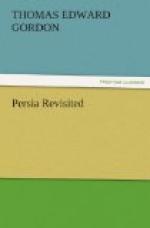[Illustration: PIPE BEARER IN A PERSIAN ANDERUN]
There are now signs of the people resenting the arrogant assumption or power by the Moullas, and freeing themselves from their thraldom. There has always been great liberty of opinion and speech in Persia, and six hundred years ago the poets Khayyam and Hafiz took full advantage of this in expressing their contempt for the ‘meddling Moullas.’ Not very long ago the donkey-boys in one of the great towns would on occasion reflect the popular feeling by the shout ‘Br-r-r-o akhoond!’ (Go on, priest!) when they saw a Moulla pattering along on his riding donkey. Biro is Persian for ‘go on,’ and, rolled and rattled out long and loud, is the cry when droves of load-carrying donkeys are driven. The donkey-boy in Persia is as quick with bold reply as he is in Egypt and elsewhere. There is a story that a high Persian official called out to a boy, whose gang of burden-bearing donkeys obstructed his carriage, ’Out of the way, ass, you driver of asses!’ and was promptly answered, ’You are an ass yourself, though a driver of men!’
As a finish to this reference to the Tobacco Regie in Persia, I may mention it is believed that, had the company started as ordinary traders, they, having the command of ready money, would have succeeded well. The commencement made in the centres of tobacco cultivation impressed the peasant producers most favourably; they appreciated the advantages of cash payments, and regretted the cessation of the system, and the governors benefited by the readiness with which the taxes were paid. But the explanation of monopoly, a word which was then unknown in Persia, raised the fears of the people, and those who had the money to spare laid in a supply of tobacco before the concession came into force. This was regarded by the poor as proof of the coming rise in price, and they therefore hailed the Moullas as their deliverers from the threatened calamity of dear tobacco.
The only public debt of Persia is that of a loan contracted in order to pay the compensation for cancelment of this concession, and the expenses which had been incurred; but the sale by the Government of the foreign export (part of the cancelled concession) very nearly provides for the loan. The Societe de ‘Tombac’ of Constantinople, which bought the monopoly of export, has had difficulties to contend with, caused by a Persian combination to buy from the cultivators and sell to the foreign agents. A prominent Moulla was named as interested in this business, which was in reality at direct variance with the principles on which the priesthood had declared the original concession to be ‘unlawful.’ This interference with the free trade conditions existing when the Constantinople company made its contract led to a dispute, which ended with a fresh agreement, in which there is said to be a stipulation that, should the Persian Tobacco Regie in its original form be revived at any time, French subjects are to have the first offer.




